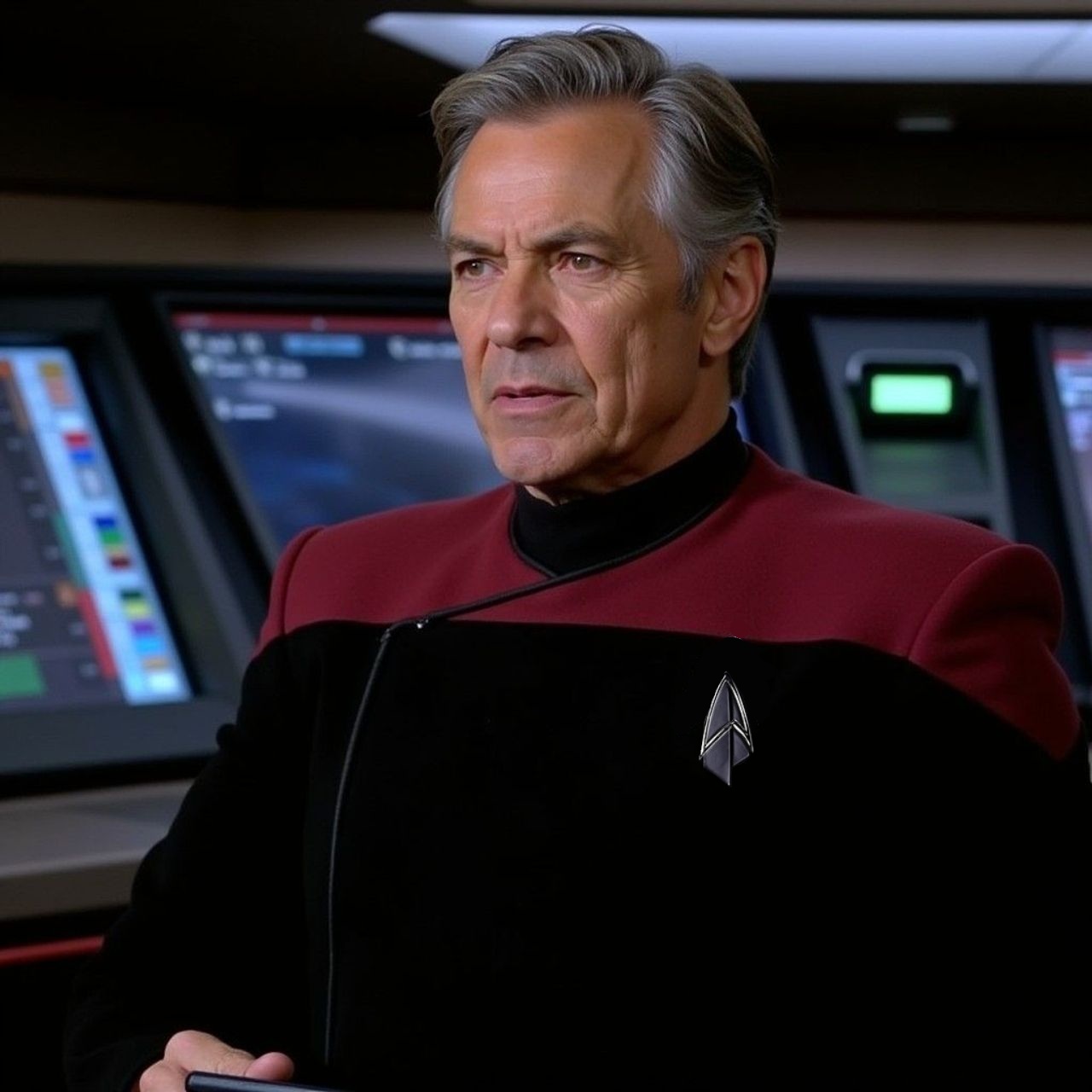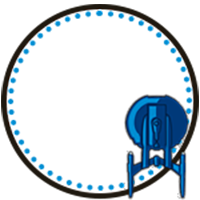The sun rose in the west, as it did every morning. As Professor Imbalta walked the grounds of the Vesparan Academy for Agrarian Studies, he heard only the whisper of a light breeze and the sweet song of warblers as they sang wee-see wee-see wee-see.
The aged Bolian could not help but smile. Days like this reminded him why he’d given up his old life and moved to a paradise unadulterated by the industrial and digital machinations that had sucked the beauty from so many other worlds. Sure, he’d abandoned an illustrious career in warp field theory, but teaching agroscience to young farmers was its own sort of reward, and it came with the opportunity to live in a sanctuary free from the grunge of the rest of the galaxy. Vespara Prime had no factories and mines, nor replicators and synths, nor even the handheld PADDs and tricorders that everyone else spent their days staring down at. On Vespara, you were encouraged to look up, and to enjoy. It was a refuge where the six million who called it home enjoyed a simpler, more fulfilling form of living.
Or it was.
It was until this moment, a moment when, in an instant, everything changed.
Suddenly, it became cold. Very cold. And dark. Darker than it ever should have been on a midsummer morning.
Professor Imbalta looked to the sky as if expecting to see a storm. But there was not a cloud in the sky, not even a lonely wisp to occlude the direct sunlight. Instead, as he looked to the sky, he saw something he could not explain: the sun seemed dimmer, and it appeared to be flickering. K-Type main sequence star didn’t do that, he knew from his prior life. The orange dwarf at the system’s center had at least another five billion years of juice in it, and after that, it would grow into a red giant over another billion years. And that would come with an increase in luminosity, not a decrease. What, then, was going on? Why was it suddenly darkening?
Maybe he was just seeing things, he thought to himself. He closed his eyes and then opened them again. No, it was still flickering. He closed them again, and opened them again. Still, there was no change. As he squinted at the sun, he swore it almost seemed lower too. That didn’t make any sense. None of it did.
Around him, others were pointing at the sky and talking in hushed tones. Astrophysics wasn’t taught on Vespara – to worry about off-world matters was simply not their way – so for these young people, they had nothing to go on, but admittedly, even though he did have a past career to lean on, he didn’t really have anything to go on either. Stars didn’t do what theirs was doing.
The Bolian broke into a jog, making for his office as fast as his old legs could carry him. Vespara had no modern technical wizardry, no astrometrical scanners or neutrino telescopes to speak of, but buried somewhere in his desk, he still had a trinket from the before-times that might help. And right now, answers were more important than maintaining the ignorant harmony of their society.
“Professor! Professor!” came an out-of-breath voice from behind him. “Professor, what is going on?” It was one of his students, a young man named Malik, one of the curious ones who’d actually asked him a few questions over the years about the galaxy beyond Vespara.
“I’m really not sure,” Professor Imbalta admitted as they came upon his office. Quickly, he rummaged through his desk, and beneath a heap of papers, he found what he was looking for. “With this, I’m hoping we can figure it out.” The professor pulled out his old tricorder, a relic from a bygone era. He popped it open for the first time in years, but it chirped to life like not a day had passed. Its microfusion power cell would outlive them all. “Let’s go.”
As Malik followed his mentor back outside, he looked curiously at the device. For those beyond Vespara, a tricorder was a near-constancy, a simple device used for even menial tasks, but for Malik, a boy who was born in the maize fields to the south, it was completely foreign. Even the beeps it made were alien. They simply didn’t have such things on Vespara.
“Umm, this is very strange…” Professor Imbalta mused as he pointed the device towards the sun. “It’s… it’s… it’s supposed to be the middle of summer, but our orbital inclination suggests we’re headed into the middle winter.” He hadn’t been seeing things earlier. The sun was lower in the sky.
“I’m sorry professor. I don’t understand. What do you mean by orbital inclination?” It was not their way, on Vespara, to study that which lay beyond. It was part of what made their life so idyllic, the way they very intentionally kept focus on the then and now.
“The seasons we talk about,” Professor Imbalta explained. “In our culture, we focus on how our seasons impact the flora and fauna, but fundamentally, the seasons are an outcome of celestial movement. Our planet tilts as it rotates around the sun, and this inclination, relative to the equatorial plane, is what causes warmth in the summer and cold in the winter. Right now, our hemisphere should be tilted towards the sun, but according to my readings, we’re actually tilting away, as if heading into winter.” The frigid air outside certainly emphasized the point.
“How does that happen?”
“I’m not sure,” Professor Imbalta admitted. He didn’t want to worry the boy, and he tried to keep a straight face, but he was nervous. Something was wrong. Planets didn’t just change their tilt in an instant. As he continued to look at the readings, he noticed something else. “Also, we should be in the midst of our retreat towards the aphelion, but according to my readings, we’re actually moving back towards the perihelion.”
Again, his young student just looked at him with confusion on his face.
“Sorry, all gibberish to you,” Professor Imbalta apologized, acknowledging that these were not things they spoke of in pleasant conversation on Vespara. “Our planet rotates in an elliptical orbit, and this time of year, we should be moving further from the sun.” He moved his hands as if to illustrate the point. “This alignment between orbital movement and planetary tilt – we lean in while we move away – helps offset the impact of the summer’s inward orbital tilt for the southern hemisphere, which is why our summers are so mild in the south.”
“And that’s why we have so few villages in the north, huh?” Malik asked, starting to catch on. He hadn’t been taught these things, but he was a quick study. “If that’s how it works in the south, the opposite would be true in the north right? And that’s why they have squelching hot summers and freezing cold winters up there, isn’t it?” He had always wondered why the north was so inhospitable, but it wasn’t the Vesparan way to ask such questions. Now, though, he knew.
“Yes, exactly,” nodded Professor Imbalta. “Or that’s how it should be… except right now. Right now, according to these readings, we’re moving inward, not outward.”
“But why is it so cold then?” Malik asked as a gust of cold wind washed over them. “Didn’t you just say that, when we get closer to the sun, it gets warmer?”
“If all things were equal, that would be the case,” Professor Imbalta nodded. “But in geophysics, they have a saying: inclinations over ellipses.”
Neither of them had any way to know that, in a mere six hours, the planetary tilt would flip again, and, in a coalescence of tilt and orbital distance, they’d experience a summer afternoon to rival the hottest the north had ever seen. And it would just get worse from there.
“And what’s going on with the sun?” Malik asked. It was still flickering.
“More questions to which I don’t have answers, my young friend,” Professor Imbalta frowned as he patted the boy comfortingly on the shoulder.
Without a gravimetric interferometer, the professor had no way of detecting the photon lensing occurring just beyond the corona of the Vesparan star, nor did he have access to a high resolution spectroscope that might have been able to see the new accretion lines trailing out from deep in the photosphere.
“Why is this all happening?”
“I have not the slightest idea,” Professor Imbalta sighed as he closed his tricorder. “But I know what we need to do.” He began to walk quickly across the grounds. “Come with me. We need to get down to the main administration building.”
“Why?”
“It’s the only place with a subspace communicator,” Professor Imbalta explained. “We need to place a call… and quickly.” Whatever was going on, it went far beyond what they could explain on their own, and if things continued to worsen, they might need far more than an explanation. They might, in fact, need a lifeline.
“Who are we going to call?”
“Starfleet.”
Only then did Malik realize the gravity of the situation.

 Bravo Fleet
Bravo Fleet




















